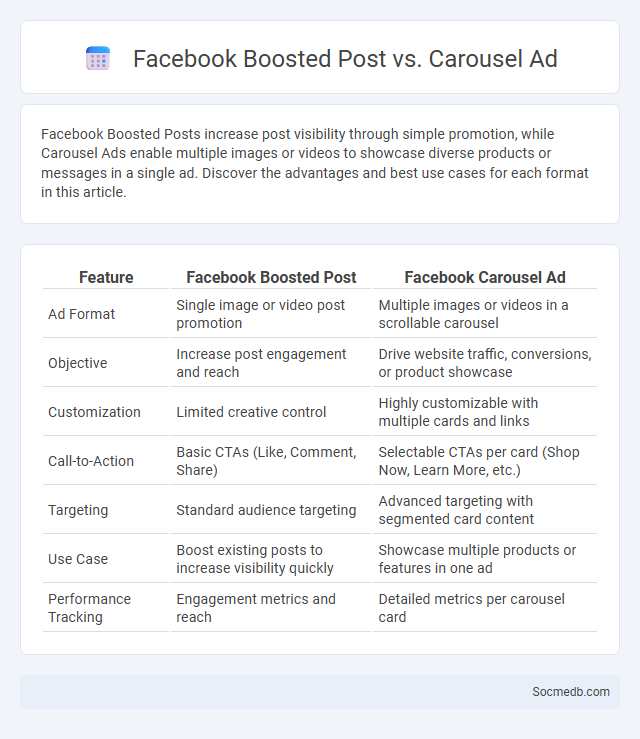
Photo illustration: Facebook Boosted Post vs Carousel Ad
Facebook Boosted Posts increase post visibility through simple promotion, while Carousel Ads enable multiple images or videos to showcase diverse products or messages in a single ad. Discover the advantages and best use cases for each format in this article.
Table of Comparison
| Feature | Facebook Boosted Post | Facebook Carousel Ad |
|---|---|---|
| Ad Format | Single image or video post promotion | Multiple images or videos in a scrollable carousel |
| Objective | Increase post engagement and reach | Drive website traffic, conversions, or product showcase |
| Customization | Limited creative control | Highly customizable with multiple cards and links |
| Call-to-Action | Basic CTAs (Like, Comment, Share) | Selectable CTAs per card (Shop Now, Learn More, etc.) |
| Targeting | Standard audience targeting | Advanced targeting with segmented card content |
| Use Case | Boost existing posts to increase visibility quickly | Showcase multiple products or features in one ad |
| Performance Tracking | Engagement metrics and reach | Detailed metrics per carousel card |
Introduction to Facebook Advertising Options
Facebook advertising options include diverse formats such as image ads, video ads, carousel ads, and collection ads, each designed to engage different audience segments effectively. The platform offers precise targeting features based on demographics, interests, behaviors, and location, enabling businesses to reach their ideal customers. Facebook Ads Manager provides tools for campaign optimization, budget control, and performance tracking, ensuring advertisers maximize ROI.
What is a Facebook Boosted Post?
A Facebook Boosted Post is a paid promotion tool that increases the visibility of a regular post by targeting specific audiences based on demographics, interests, and behaviors. This feature allows businesses and individuals to extend their reach beyond organic followers, driving more engagement, website traffic, or conversions. Boosted Posts are optimized through Facebook's advertising algorithm to deliver content to users most likely to interact with it, enhancing overall campaign effectiveness.
Understanding Facebook Carousel Ads
Facebook Carousel Ads allow your business to showcase multiple images or videos within a single ad, each with its own link, increasing engagement and click-through rates. This format provides a dynamic and interactive experience for users, enhancing storytelling and product highlighting. Optimizing your Carousel Ads with compelling visuals and clear calls-to-action can significantly boost your social media marketing performance.
Key Differences: Boosted Post vs. Carousel Ad
Boosted posts amplify existing content to reach a broader audience through simple targeting, making them ideal for increasing post engagement quickly. Carousel ads showcase multiple images or videos in a single ad unit, offering interactive storytelling and diverse product displays that drive higher conversion rates. Choosing between a boosted post or carousel ad depends on Your campaign goals, whether it's broad visibility or detailed brand interaction.
Objectives and Best Use Cases
Social media platforms serve key objectives such as brand awareness, customer engagement, and lead generation, leveraging targeted content to reach specific audiences effectively. Best use cases include influencer partnerships for authentic promotion, real-time customer service to enhance user satisfaction, and data-driven advertising campaigns that optimize ROI. Businesses maximize social media impact by aligning platform features with strategic goals like community building and market research.
Targeting and Audience Reach
Effective social media targeting involves leveraging data-driven algorithms to identify specific demographics, interests, and behaviors, maximizing audience reach and engagement. Platforms like Facebook, Instagram, and LinkedIn offer advanced targeting tools such as lookalike audiences, retargeting, and geo-targeting to connect with niche markets. Optimizing audience segmentation enhances ad performance, reduces cost-per-click, and increases conversion rates by delivering relevant content to the most responsive users.
Creative Formats and Visual Appeal
Creative formats such as interactive stories, reels, and carousel posts significantly boost engagement by capturing audience attention through dynamic content. Visual appeal is enhanced by high-resolution images, consistent color schemes, and brand-aligned aesthetics, which foster stronger brand recognition and user retention. Leveraging video content and infographics further amplifies message clarity and shareability across social media platforms.
Cost and Budget Considerations
Social media campaigns offer diverse budgeting options, allowing you to tailor expenses based on platform advertising rates and target audience reach. Costs vary significantly across platforms such as Facebook, Instagram, and LinkedIn, with average cost-per-click (CPC) ranging from $0.50 to $3.00 depending on industry and ad quality. Efficient budget allocation ensures maximum ROI by optimizing ad spend through precise audience targeting and monitoring campaign performance metrics.
Performance Metrics and Analytics
Social media performance metrics and analytics provide crucial insights into audience engagement, reach, and conversion rates. Key indicators include click-through rates (CTR), follower growth, impressions, and sentiment analysis, which help optimize content strategy and measure return on investment (ROI). Advanced tools like Google Analytics, Hootsuite, and Sprout Social enable real-time tracking and data visualization for informed decision-making in social media campaigns.
Choosing the Right Format for Your Goals
Selecting the right social media format significantly impacts your content's effectiveness in reaching your target audience and achieving specific goals like engagement, brand awareness, or conversions. Visual formats such as videos and infographics excel at capturing attention and conveying complex information quickly, while text-based posts foster detailed communication and community interaction. Understanding audience preferences and platform algorithms ensures your chosen format maximizes reach and supports your marketing objectives efficiently.
 socmedb.com
socmedb.com